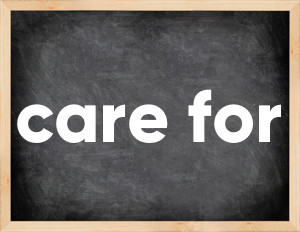 The English verb 'care for' is pronounced as [keə fɔː].
The English verb 'care for' is pronounced as [keə fɔː].
Related to:
regular verbs,
phrasal verb.
3 forms of verb care for: Infinitive (care for), Past Simple - (cared for), Past Participle - (cared for).
Here are the past tense forms of the verb care for
👉 Forms of verb care for in future and past simple and past participle.
❓ What is the past tense of care for.
Care for: Past, Present, and Participle Forms
| Base Form | Past Simple | Past Participle |
|---|---|---|
| care for [keə fɔː] |
cared for [kɛəd fɔː] |
cared for [kɛəd fɔː] |
What are the 2nd and 3rd forms of the verb care for?
🎓 What are the past simple, future simple, present perfect, past perfect, and future perfect forms of the base form (infinitive) 'care for'?
Learn the three forms of the English verb 'care for'
- the first form (V1) is 'care for' used in present simple and future simple tenses.
- the second form (V2) is 'cared for' used in past simple tense.
- the third form (V3) is 'cared for' used in present perfect and past perfect tenses.
What are the past tense and past participle of care for?
The past tense and past participle of care for are: care for in past simple is cared for, and past participle is cared for.
What is the past tense of care for?
The past tense of the verb "care for" is "cared for", and the past participle is "cared for".
Verb Tenses
Past simple — care for in past simple cared for
(V2).
Future simple — care for in future simple is care for (will + V1).
Present Perfect — care for in present perfect tense is
cared for
(have/has + V3).
Past Perfect — care for in past perfect tense is
cared for
(had + V3).
care for regular or irregular verb?
👉 Is 'care for' a regular or irregular verb? The verb 'care for' is regular verb.
Examples of Verb care for in Sentences
- Sara doesn't care for rich desserts (Present Simple)
- We must always care for those in need (Present Simple)
- Children care for some more cake (Present Simple)
- This clinic provides free care for indigent patients (Present Simple)
- They can care for themselves (Present Simple)
- We provide medical care for elderly people (Present Simple)
- John doesn't care for chi-chi poetry (Present Simple)
- Liza doesn't care for pop stuff (Present Simple)
- He cared for her but she decided to leave (Past Simple)
- I will care for him, go take a rest (Future Simple)